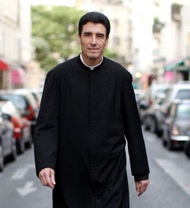Contemplatio translates as contemplation, but really this is one best left in the Latin.
A good definition of contemplatio is “the mind and the soul suspended in God.” It is knowing Jesus in the most sublime fashion; a preview of the Beatific Vision; a taste of the Heavenly Banquet. I think this is often what beginners imagine prayer to be. A tangible closeness with God. An experience. Something we feel, rather than something we do. But we have no agency in contemplatio. It is absolute grace — a gift from God which many souls receive frequently, and other souls receive very rarely. It is never a measure of holiness or progress in the spiritual life.
For example, take Mother Teresa. At the age of 36, when she was a Loreto sister, then-Sister Teresa received extraordinary graces and consolations which ultimately inspired her to leave the Loreto convent and found the Missionaries of Charity. But once that work had begun, the Lord withdrew from her. By all accounts, for the rest of her life — fifty years, except for a three week respite in 1958 — her prayer was desolate. She confided to her spiritual director that she felt no presence of God whatsoever, neither in her heart, nor in the eucharist.
Where is my faith? Even deep down … there is nothing but emptiness and darkness … If there be a God — please forgive me. When I try to raise my thoughts to Heaven, there is such convicting emptiness that those very thoughts return like sharp knives and hurt my very soul … How painful is this unknown pain — I have no Faith. Repulsed, empty, no faith, no love, no zeal, … What do I labour for? If there be no God, there can be no soul. If there be no soul then Jesus, you also are not true.
Mother Teresa, Come Be My Light, p. 193.
You might recall, when these recollections were first published, that it caused sensation in the secular press, and it caused scandal among some of the faithful. Don’t Mother Teresa’s doubts expose a lack of faith and holiness?
The answer is no. The Lord withdrew his consolations, which meant that Mother Teresa never attained the heights of contemplatio. But still she was faithful to her apostolic work with the poor, and she was faithful to her prayer. Every day, without exception, she practiced lectio and meditatio and oratio. Every day. And she insisted her daughters do the same. The daily rule of life for Missionaries of Charity includes an hour of oratio in the morning, and an hour and three quarters of of lectio, meditatio, and Eucharistic adoration in the afternoon.
So that’s contemplatio. Don’t despair if you have never reached this, even after years of effort. Contemplatio is pure gift; it is never earned, and it is not a measure of holiness. Many of the saints were deprived of it.






Well I think this coming Sunday is Mission Sunday so blends in with this post Fr. John Corrigan!
Also this Sunday is the Hamilton Cup! But tomorrow is Cox Plate at Moonee Valley! Is anyone going! I won’t be!
My tips
Race1No6 Preemptive- It is 101 chance!
13. Bangs-
15. Pitsburgh- Bart’s Cummings son trains this horse.
Race2
Small field 4. Vatican and 7. Magnus Reign
Race3
No7. Dangny
Race4. No5 Well Sighted
2. Demonstrate
8. Truculent
Race5No3 Haybah
9. Postive Charge
10. Valley Sweetheart
Race6
2. Big Memory
1. Precedence- Bart’s Cummings grandson trains this one! Bart had this horse too!
7. The United States
Race7No9. Assertive Star- I tipped this horse last week but it was scratch maybe tomorrow it will fire up!
5. Kentucky Flyer- Good odds has been racing well.
2. Sovereign Nation
Race8
My numbers are
3. Strawberry Boy- Due to have some luck!
9. Sons of John- Here one for Fr. Corrigan had no luck last start!
2. Hooked- Good horse ready to do something!
Race9 The Cox Plate 5.40pm
1. Criterton- Well I tipped two weeks so I better tip it again!
2. Fawker- Ran second last year it may bob again!
6. The Cleaner- From Tassie alot toughter horse this year!
12. Preeferment- Ready for this maybe more a Melbourne Cup horse but who knows it be flashing home!
Race10
3. Do you remember! Good name for a horse!
5. Coranation Shallan Ran 3rd last week I did tell you! Loves this track
7. Precious Gem- Good honest horse
13. Holy Cow- Loves the valley.
In Adelaide I like Race3No4 Race8No4 and 12
Happy Punting and Happy Weekend from Simon the Pieman.